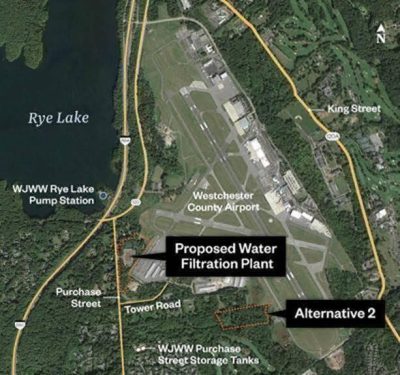Water Filtration Plant Construction at Westchester Airport Eye for ‘24
News Based on facts, either observed and verified directly by the reporter, or reported and verified from knowledgeable sources.

Westchester Joint Water Works (WJWW) was recently awarded a $30 million state grant to help pay for a new filtration plant at Westchester County Airport that will make drinking water safter for about 100,000 county residents.
The latest round of money for construction of the Rye Lake Water Filtration Plant, a $138 million project, will mitigate excessive levels of haloacetic acid, which potentially can increase the likelihood of cancer in people who are exposed to it long term. The funds will be derived from the $4.2 million Environmental Bond Act of 2022.
Rye Lake is part of the Kensico Reservoir, which supplies water to roughly 100,000 Westchester residents and is the primary source of water for New York City. The water is treated but it does not meet the current standards, which can be achieved by building a filtration plant, said Paul Kutzy, manager of WJWW.
Kutzy said it will likely take about three years to complete the project once construction starts, which is anticipated for sometime next year. However, WJWW must first complete a land swap of 13.4 acres with the county for a more advantageous parcel at the airport as determined by engineers before work can begin, he said.
“This funding will help offset the costs associated with building the mandated water filtration plant. and in so doing, mitigate the impact to ratepayers,” Kutzy said. “Most importantly, the funding helps facilitate safe water for generations to come.”
WJWW, a nonprofit public benefit corporation, has been under orders for years from multiple levels of government and the courts to build a filtration plant to protect the public’s drinking water.
Kutzy said initially WJWW received an order more than 15 years ago when it was supposed to build a filtration plant in 2008 to comply with minimal treatment requirements set by the state Department of Health and the U.S. Environmental Protection Agency (EPA) for surface water in drinking sources.
More recently, WJWW had been under orders from the state Supreme Court and the EPA and will be subject to action by the U.S. Department of Justice to treat haloacetic acids, which has been found in its water distribution system and exceeds current maximum contaminant level standards. The only way to have sidestepped building a plant would have been to obtain permission through the state Department of Health’s Filtration Avoidance Determination, Kutzy said.
Filtering the water removes organic matter that naturally occur in lakes and reservoirs, which increases the likelihood that haloacetic acid forms.
The Department of Justice has been in U.S. District Court on the matter and is expected to issue a consent decree to WJWW within the next month or two, according to Kutzy. That consent decree will determine the short- and long-term deadlines connected to the plant’s construction, including when the transaction for the land swap must be executed, he said.
“We’re not there yet, but that’s what’s needed first in order for us to build,” Kutzy said.
WJWW was required to conduct a review under the state Environmental Quality Review Act (SEQRA) and adopted the findings statement in October 2022. The environmental review concluded that the site that will be obtained through the land swap was superior to all other locations that were explored.
Kutzy added that the current schedule would have the plant operational sometime in 2027.
For more information about the project, visit DemandSafeWater.org or www.wjwwfiltration.org.

Martin has more than 30 years experience covering local news in Westchester and Putnam counties, including a frequent focus on zoning and planning issues. He has been editor-in-chief of The Examiner since its inception in 2007. Read more from Martin’s editor-author bio here. Read Martin’s archived work here: https://www.theexaminernews.com/author/martin-wilbur2007/
